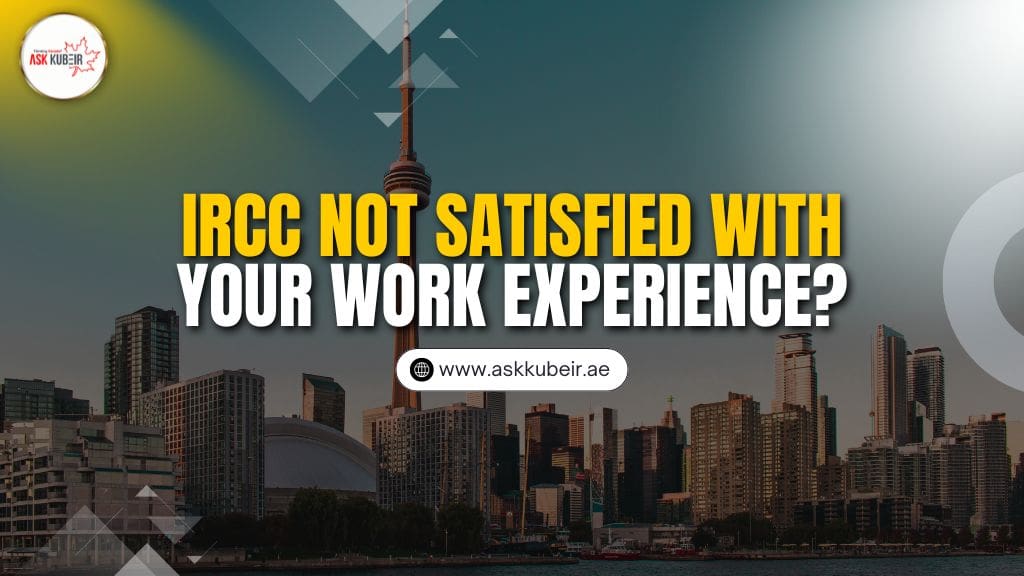
When applying for Canadian permanent residency (PR), your work experience plays a big role. It helps you qualify for programs like Express Entry, and it boosts your CRS (Comprehensive Ranking System) score.
But sometimes, the immigration officer reviewing your application may have doubts or questions about your work experience. Don’t worry—this doesn’t always mean rejection. You may just need to provide more documents or clarification.
This blog will help you understand why IRCC may not be satisfied with your work experience and how you can respond.
When IRCC Isn’t Sure You Picked the Right NOC Code
Canada uses the NOC (National Occupation Classification) system to match your job title and duties to an official code. You must pick the correct NOC code that matches the job you did. This is important both when you create your Express Entry profile and when you submit your PR application.
IRCC officers will look at two things:
- The lead statement for your NOC code
- The list of main duties, especially the essential duties
If your job duties don’t match what’s listed under that NOC, the officer might question your experience.
To fix this, you can send extra documents to show that your job really does match the NOC code. Examples include:
- A letter from your employer confirming your job duties
- Photos showing you doing your job
- Invoices or professional documents proving your work
- For regulated jobs (like doctors, nurses, lawyers): licenses or qualification certificates
- If you’re self-employed: business registration papers, income records, and client contracts (note: personal affidavits are not accepted)
When You’re Self-Employed or Claiming Canadian Work Experience
Some immigration programs, like Canadian Experience Class (CEC), do not accept self-employed work experience. If you worked in Canada, IRCC wants to make sure it was through a regular job with a Canadian employer, not as a freelancer or business owner.
To prove this, you should show documents such as:
- T4 tax slips
- Notices of Assessment (NOA) from the CRA
- Reference letters from your employer
If you don’t have those, you can also submit:
- Employment letters
- Pay stubs
- Work contracts
Officers may look at things like:
- Did you control how the work was done?
- Did you provide your own tools?
- Could you hire or subcontract others?
- Did you invest money into the company?
- Were you running a business instead of being an employee?
If you were truly working for a company, make sure to send documents showing:
- You did not run the business
- You did not hire others
- You had no financial risk
When You’re in a Regulated Profession
Some jobs, like doctors, lawyers, or engineers, are regulated professions. That means you need a license to do the job in the country you worked in.
If you’re applying based on work experience in one of these fields, IRCC may want proof that you were legally allowed to work in that job.
To prove this, send:
- Employment letters and job contracts
- Reviews or performance evaluations
- Foreign degrees and certifications
- Training or education completion documents
- Offers of employment in that profession
You may also have to explain the rules and licenses needed to work in that job in your country—especially if the officer is not familiar with them.
What If IRCC Asks You for More Information?
Every application is reviewed by a real person. If they’re unsure, they might ask for additional documents or clarification. This doesn’t mean your application is being rejected—it’s a chance for you to clear things up.
So if you get a request from IRCC, don’t panic. Just carefully gather the correct documents, and respond as soon as possible.
Final Thoughts
Getting your work experience accepted by IRCC is not just about listing jobs. You need to prove what you did, how long you did it, and that it matches the Canadian standards. If IRCC has doubts, they will ask—but you can respond clearly with proper documents and increase your chances of success.

Can I change my NOC code after applying?
No, you can’t change the NOC code after you’ve submitted your PR application. That’s why it’s important to choose the correct one before applying.
What if my employer won’t give me a reference letter?
Try to collect alternative documents like pay slips, tax records, contracts, and communication with your employer to support your claim.
Can I count freelance work for Express Entry?
You can count self-employment for Federal Skilled Worker (FSW) but not for Canadian Experience Class (CEC). Make sure your program allows it.
Does IRCC accept online work experience?
Yes, but only if you can prove that the work was full-time, paid, and matched the NOC duties. Also, the employer must be valid, and the job must follow labor standards.
How much detail should be in the job reference letter?
A reference letter should include your job title, employment dates, working hours, job duties, and salary. It should be on official company letterhead and signed by someone at your company.

📞 Call us: 04 260 7837
📲 WhatsApp: wa.me/971529693030
🌐 Website: www.askkubeir.ae
📍 Office No. 45, 9th Floor, Conrad Tower, WTC, Dubai
CREDIT: CIC NEWS





